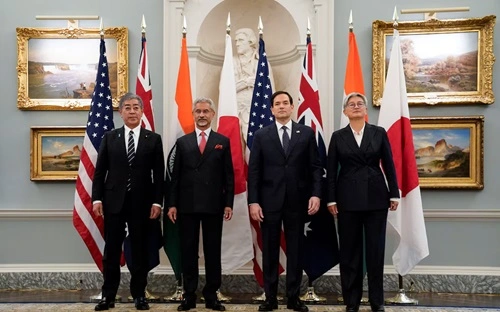In a significant diplomatic engagement, the foreign ministers of the Quadrilateral Security Dialogue (Quad) nations—India, the United States, Australia, and Japan—gathered in Washington, D.C., marking the first such meeting under President Donald Trump’s second term. The assembly underscores the Quad’s dedication to fostering a “free, open, stable, and prosperous Indo-Pacific,” amidst evolving geopolitical dynamics.
Reaffirming the Quad’s Vision

External Affairs Minister S. Jaishankar represented India at the meeting, alongside U.S. Secretary of State Marco Rubio, Australian Foreign Minister Penny Wong, and Japanese Foreign Minister Iwaya Takeshi. The ministers deliberated on various strategies to enhance cooperation in the Indo-Pacific region, emphasizing adherence to international law, democratic principles, and the sovereignty of nations. In a joint statement, they articulated their collective stance:
“We, the secretary of state of the United States and the foreign ministers of Australia, India, and Japan, met today in Washington, D.C., to reaffirm our shared commitment to strengthening a free and open Indo-Pacific where the rule of law, democratic values, sovereignty, and territorial integrity are upheld and defended.”
Strategic Discussions and Future Plans
The meeting facilitated comprehensive discussions on ensuring regional prosperity and security. Minister Jaishankar highlighted the importance of expanding the Quad’s agenda and deepening collaborative efforts. He stated,
“Our wide-ranging discussions addressed different dimensions of ensuring a free, open, stable, and prosperous Indo-Pacific. Agreed on the importance of thinking bigger, deepening the agenda, and intensifying our collaboration.”
The ministers also announced plans for regular consultations leading up to a leaders’ summit in India later this year, signaling a commitment to sustained engagement and strategic planning.
Contextualizing the Meeting
This gathering holds particular significance as it occurred shortly after President Trump’s inauguration, indicating the administration’s prioritization of the Quad framework in its foreign policy agenda. Secretary Rubio, known for his assertive stance on China, emphasized the necessity of the Quad in counterbalancing regional challenges. He remarked,
“The Quad is a major component of the American strategy to counter China’s growing assertiveness and vast territorial claims in the region.”
Historical Evolution of the Quad
The Quad was initially established in 2007, bringing together nations that collaborated during the 2004 Indian Ocean tsunami relief efforts. Over the years, it has evolved into a strategic forum addressing various regional issues, including infrastructure development, humanitarian aid, disaster relief, climate change, and maritime security. The recent ministerial meeting signifies a continued commitment to these objectives, with an added focus on countering unilateral actions that threaten regional stability.
Implications for Regional Dynamics
The reaffirmation of the Quad’s principles and the planned leaders’ summit in India are poised to influence Indo-Pacific geopolitics significantly. By strengthening their partnership, the Quad nations aim to promote a rules-based order and deter actions that could alter the status quo through coercion or force. This collective stance serves as a strategic counterbalance to any regional assertiveness that challenges established international norms.
Conclusion
The recent Quad foreign ministers’ meeting in Washington, D.C., underscores a unified approach to ensuring peace, stability, and prosperity in the Indo-Pacific region. Through reaffirmed commitments and strategic planning, the Quad nations demonstrate their resolve to act as a “force for global good,” addressing contemporary challenges and upholding the principles that underpin regional and global order.
Hina Abbasi is Editor and a passionate sports and entertainment content writer at WinnersMaze.com. Hina’s expertise spans across a wide range of sports, and interest in many TV shows allowing her to deliver insightful analysis and compelling stories that resonate with readers.

